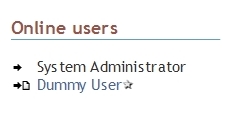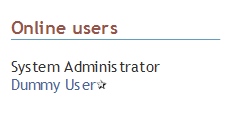This page needs review
Module online_users
This module shows a list of the real names of users who are logged in. If users are allowed to send messages to each other, then an icon appears next to each name that can be clicked to compose a message to that user (see Inter-User Messages regarding the messaging feature). Clicking on or mousing over the user name brings up information about the user as set up in User Preferences.
Display information about users currently logged in.Go to the source code
| Parameters | Accepted Values | Description | Default | Since |
|---|---|---|---|---|
cluster |
If set to "1", separate users based on which host/server they logged on. | |||
content |
Display the number of users logged in, the list of users logged in, or both. Possible values: "count", "list" or "both". Default value: "both" | |||
silent |
If set to "1" hides the module, which allows another "who is there" module to include users that should not see it. |
Screenshots
Below are a couple of screenshots:
|
|
Module with messaging enabled 
|
Module with messaging disabled 
|
|
Place the Module on a Page
Left or Right Column
The module can be placed in the left or right column through a simple admin interface - see Module Admin for how to do that.
In the Text Area
This PluginModule code:
Placing the Online Users Module in the Text Area
Copy to clipboard
{MODULE(module=>who_is_there)}{MODULE}
Produces on this site:
Online Users
1
online user
Related Pages
See these pages for information that applies for all modules:
- Module — Overall introduction and overview
- Module Admin — Introduction to the module admin pages for site-wide and individual module settings
- Assigning Modules — How to select a module to configure it
- Module Settings Interface — Interface for configuring individual module settings
- Module Settings Parameters — Explanation of standard parameter settings for modules
- Creating Custom Modules — How to create user modules
- Index of Modules — Links to the documentation of individual modules
- User Modules — How (if the feature is active) users can choose and place their modules
- Mods Type Modules — Links to modules that are installed as components
- See Module who_is_there for a similar module